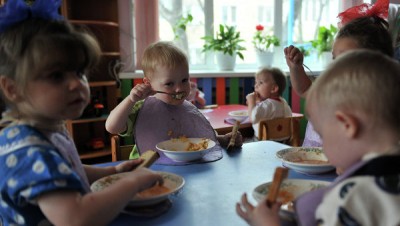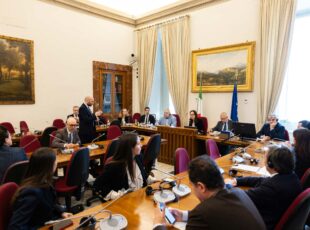Khodorkovsky’s Orphanage Contrasts Putin’s Adoption Ban
 When the U.S. Senate voted to pass the Sergei Magnitsky Rule of Law in Russia Act, proposing visa sanctions and other penalties against individual Russian officials suspected of corruption, everyone knew that the Kremlin had to react, but no one knew how. Pure reciprocity wouldn’t work, as very few Americans find themselves (or their assets) inside Russia. Economically speaking, the United States and Russia still don’t have a very high level of trade, although that may increase with the removal of the Jackson-Vanik Amendment and Russia’s entry into the World Trade Organization.
When the U.S. Senate voted to pass the Sergei Magnitsky Rule of Law in Russia Act, proposing visa sanctions and other penalties against individual Russian officials suspected of corruption, everyone knew that the Kremlin had to react, but no one knew how. Pure reciprocity wouldn’t work, as very few Americans find themselves (or their assets) inside Russia. Economically speaking, the United States and Russia still don’t have a very high level of trade, although that may increase with the removal of the Jackson-Vanik Amendment and Russia’s entry into the World Trade Organization.
At some point, perhaps not sincerely, an ambitious Duma member submitted a draft bill that would ban the adoption of Russian orphans by U.S. citizens. Very few people believed it would pass, even after the lower house reading. But to the disbelief of most, when President Vladimir Putin availed himself to the media for his annual 4.5 hour marathon press conference, he did not utter one negative word about the proposed bill, and as such it was passed into law.
Observers were uniformly aghast that Russia would choose to punish its most vulnerable citizens simply to get back at the U.S. in a diplomatic dispute.
Writing on her New York Times blog, Masha Gessen said she “felt like throwing up.” Television journalist Alexander Arkhangelsky wrote that any response to the Magnitsky Act that uses these children leads to “dehumanization,” while opposition veteran Grigory Yavlinsky said the law is “not only is cruel but also speaks of the Bolshevik nature and Stalinist roots of the Russian political system.”
In a new year’s letter written from Karelia, political prisoner Mikhail Khodorkovsky also condemned the unnecessary brutality of the adoption ban: “I cannot explain how our political elite, having adopted an odious budget that does not guarantee life, health and adequate care even for them, is now, out of some political objectives, depriving children of the hope of finding a family. When such a thing takes place, it is difficult to avoid feeling a heavy, grim loathing…”
And Khodorkovsky should know. Before his arrest and imprisonment in 2003, he was well known for his philanthropy in support of Russia’s most vulnerable citizens, having opened his own school and orphanage in Koralovo, known as the Podmoskovny Lyceum.
The Lyceum was first founded in 1994 in order to help provide shelter and care to orphans from socially disadvantaged families, with a special focus on children who lost a parent in the service of the military and those victimized by terrorism. The goal of the lyceum is to ensure that by the end of their time there the children are ready and able to qualify for a state grant to attend higher education in Russia.
Over the years, the Podmoskovny project became well known as an ideal model, raising the standard of care and opportunities for disadvantaged youth. Government officials and international NGOs made frequent visits to the 250-acre campus, where every year some 300 applicants would seek placement in just 50 openings in the dormitories.
The difficult conditions for orphans in Russia remains just as acute today as in 1994. According to UNICEF, there are more than 740,000 children in Russia are currently seeking adoptive homes, while only 18,470 Russians are now listed as waiting to adopt a child. The U.S. Embassy estimates that American parents adopt as many as 1,000 Russian orphans a year, making the United States one of the major sources of adoptions (more than 70,000 since the end of the Cold War), especially for special needs and disabled children who were unable to find a home among Russian families seeking adoptions. However, several high profile cases of mistreatment have been amplified by the state media, serving as the rationale for the adoption ban.
The Podmoskovny Lyceum, which occupies an 18th century estate located 40km outside Moscow, provides top quality education, housing, healthcare, and guidance services to a maximum of 250 pupils free of charge, funded entirely by donations. The principal of the school is Mikhail’s father, Boris Khodorkovsky, while his mother, Marina Khodorkovskaya, serves on the board of trustees and is deeply involved with the students as their unofficial matriarch.
Although the school had absolutely nothing to do with Yukos, it was unable to escape being pulled into the drama back in 2003, as the Russian government moved aggressively to destroy what was until that moment Russia’s most successful private company. On Oct. 3, 2003, three weeks before Khodorkovsky’s arrest, the security services conducted a raid on Podmoskovny Lyceum replete with armed Spetsnaz soldiers, terrifying the children and ransacking the campus while claiming to be searching for evidence of tax evasion. The school also survived a very difficult period in 2006 as the government froze the school’s assets and attempted force the seizure of the property. Many other philanthropic projects founded by Khodorkovsky, such as Open Russia, suffered a similar fate, however the school was able to survive, despite being forced to make deep cut backs and accept fewer students.
In 2008, the German magazine Focus visited the lyceum and interviewed Marina Khodorkovskaya at length, discussing her son’s commitment to the children and the hardships they’ve endured in order to keep the school’s doors open.
“We have children from war zones still suffering from trauma, who had finally found peace here. When they saw the uniforms and the weapons all their fear came up again and one boy turned depressive,” Khodorkovskaya told Focus, reflecting on the armed raids by security services. “My son had his father’s stories in mind; he was a war orphan and rarely saw his mother because she had to work. (…) The boarding school is a mirror of the tragedies in our country. We have 29 children here, many of which became orphans through the hostage-taking in the Beslan School and the Moscow Dubrovka Theater. Now we are waiting for children from South Ossetia.”
While the schools has persevered against the odds and continued to quietly function, it is beginning once again to receive some institutional support. In May of 2012, the well known NGO Memorial Germany signed up as financial sponsor of the school, which was seen as important gesture of solidarity for the school to continue its good work. Memorial says it finds this support worthwhile in fostering the school’s educational principles, which focus on the children and their development and allows them to live self-dependently as citizens of a new Russia. Teachers and administrators hope that in coming years Podmoskovny Lyceum can continue to grow and return to its former level of operations – especially in light of the increased need brought about by the new adoption ban law.
The contrast of Khodorkovsky’s efforts to foster support for Russia’s orphans to President Putin’s willingness to use them as “pawns in a political game” could not be clearer. There are obviously some very difficult challenges to overcome in U.S.-Russia relations, and reasonable minds can choose to disagree over the best way for the international community to pressure Russia to respect human rights. But to include children, who have no involvement or responsibility in these disputes, is beyond any basic, human sense, and a sad illustration of a political elite who have lost touch with the citizens they are supposed to represent.



